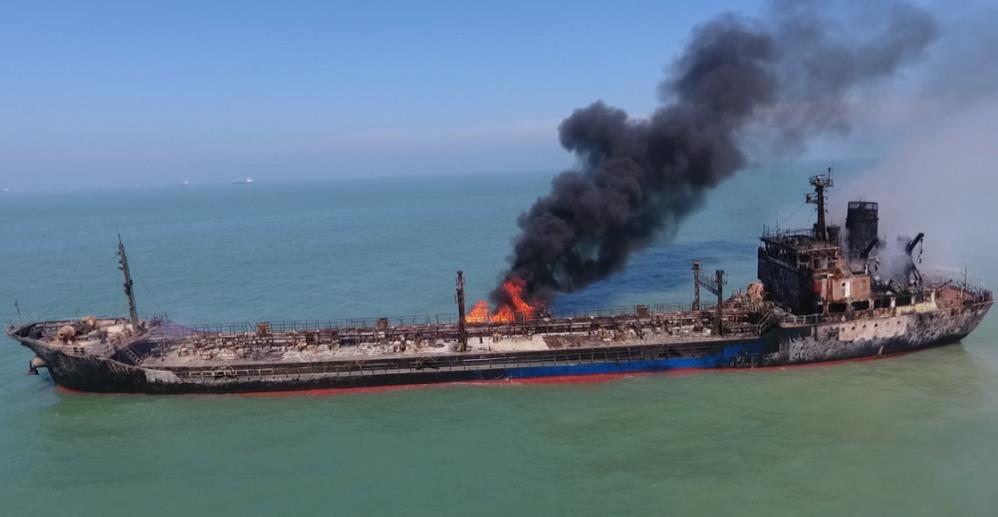With the continuous rise of temperature, especially the rolling heat wave in the midsummer, it brings hidden dangers to the navigation of ships, and the probability of fire accidents on ships is also greatly increased. Every year, there are ship fires due to various factors, causing huge property losses and even endangering the lives of the crew.
1. Pay attention to fire hazards caused by hot surfaces. The exhaust pipe, superheated steam pipe and boiler shell and other hot surfaces with temperature above 220 ℃ must be wrapped with thermal insulation materials to prevent spillage or splashing when transporting fuel oil and lubricating oil.
2. Keep the engine room clean. Reduce direct exposure to oil and oily substances; Use metal dustbins or storage equipment with covers; Timely handle the leakage of fuel, hydraulic oil or other flammable oil systems; Regularly check the discharge facilities of the fuel sleeve, and the position and condition of the flammable oil pipeline and splash plate shall also be regularly checked; Open fire operation shall strictly implement the procedures of examination and approval, hot work and fire watching, arrange operators with certificates and fire watching personnel, and prepare fire prevention equipment to the site.
3. Strictly implement the inspection system of engine room. Supervise and urge the on duty personnel of the engine room to strengthen the patrol inspection of the important machinery equipment and places (main engine, auxiliary engine, fuel tank pipeline, etc.) of the engine room during the duty period, find out the abnormal conditions and fire hazards of the equipment in time, and take necessary measures in time.
4. Regular ship inspection shall be done before sailing. Strengthen the inspection of various machines, electrical lines and fire-fighting facilities in the engine room to ensure that there are no potential safety hazards such as electricity and aging in the electrical facilities, wires and electromechanical equipment.
5. Improve the fire prevention awareness of personnel on board. Avoid the situation that the fire door is normally open, the fire alarm system is manually closed, the oil barge is negligent, the illegal open fire operation, the illegal use of electricity, the open fire stove is unattended, the electrical power is not turned off when leaving the room, and the smoke is smoked.
6. Regularly organize and carry out fire safety knowledge training on board. Carry out fire fighting drill in engine room as planned, and make relevant crew members familiar with key operations such as fixed large-scale carbon dioxide release and wind oil cut-off.
7. The company strengthened the investigation of fire hazards of ships. In addition to the daily fire-fighting inspection of the crew, the company shall also strengthen shore based support, arrange experienced locomotive and marine personnel to board the ship regularly to inspect the ship’s fire prevention work, identify fire hazards and unsafe factors, form a list of hidden dangers, formulate countermeasures, rectify and eliminate one by one, and form a good mechanism and closed-loop management.
8. Ensure the integrity of ship fire protection structure. When the ship is docked for repair, it is not allowed to change the fire prevention structure of the ship or use unqualified materials without authorization, so as to ensure that the effectiveness of fire prevention, fire detection and fire extinguishing of the ship can be maintained to the maximum extent from the perspective of structure, materials, equipment and arrangement.
9. Increase the investment of maintenance funds. After the ship has been operated for a long time, it is inevitable that the equipment will be aged and damaged, resulting in more unexpected and serious consequences. The company shall increase capital investment to repair or replace the aged and damaged equipment in time to ensure its normal operation.
10. Ensure that fire fighting equipment is available at all times. The company shall, according to the requirements, formulate practical measures to regularly inspect, maintain and maintain various fire-fighting equipment of the ship. The emergency fire pump and emergency generator shall be started and operated regularly. The fixed water fire extinguishing system shall be regularly tested for water discharge. The carbon dioxide fire extinguishing system shall be regularly tested for the weight of the steel cylinder, and the pipeline and nozzle shall be unblocked. The air respirator, thermal insulation clothing and other equipment provided in the fireman’s equipment must be kept complete and intact to ensure normal use under emergency conditions.
11. Strengthen the training of crew. Improve the fire prevention awareness and fire fighting skills of the crew, so that the crew can really play a main role in the prevention and control of ship fire.
Post time: Aug-23-2022

